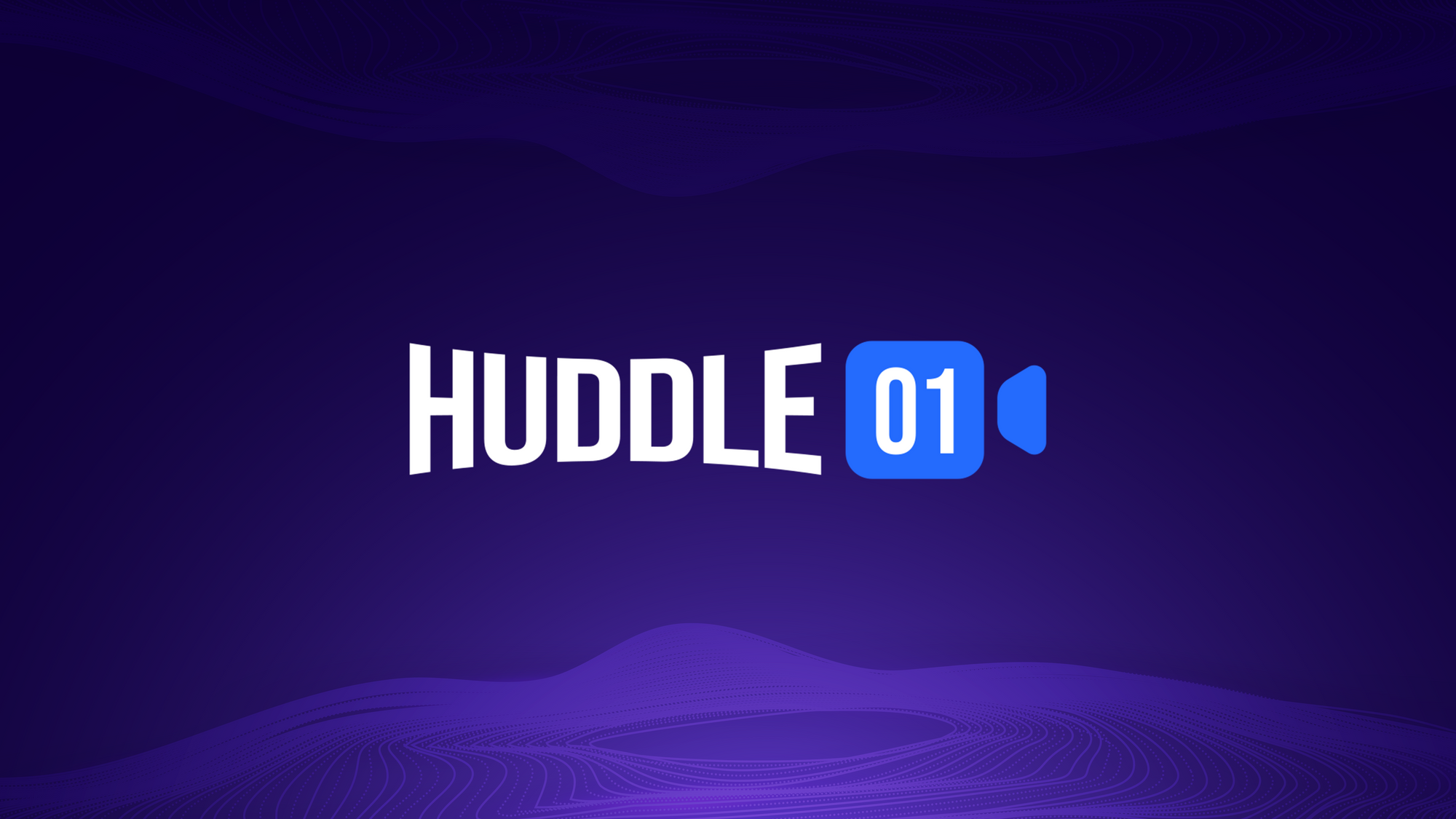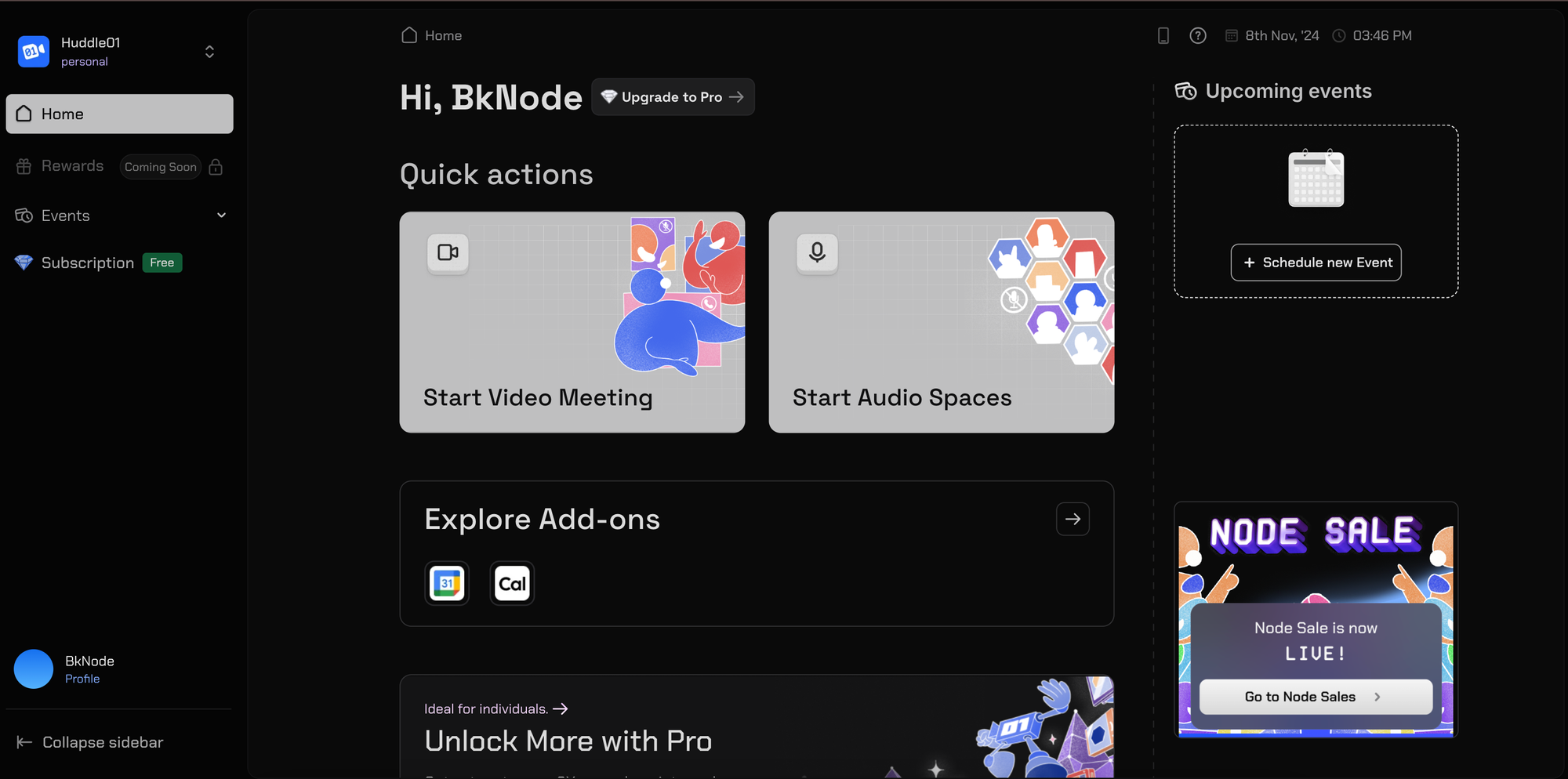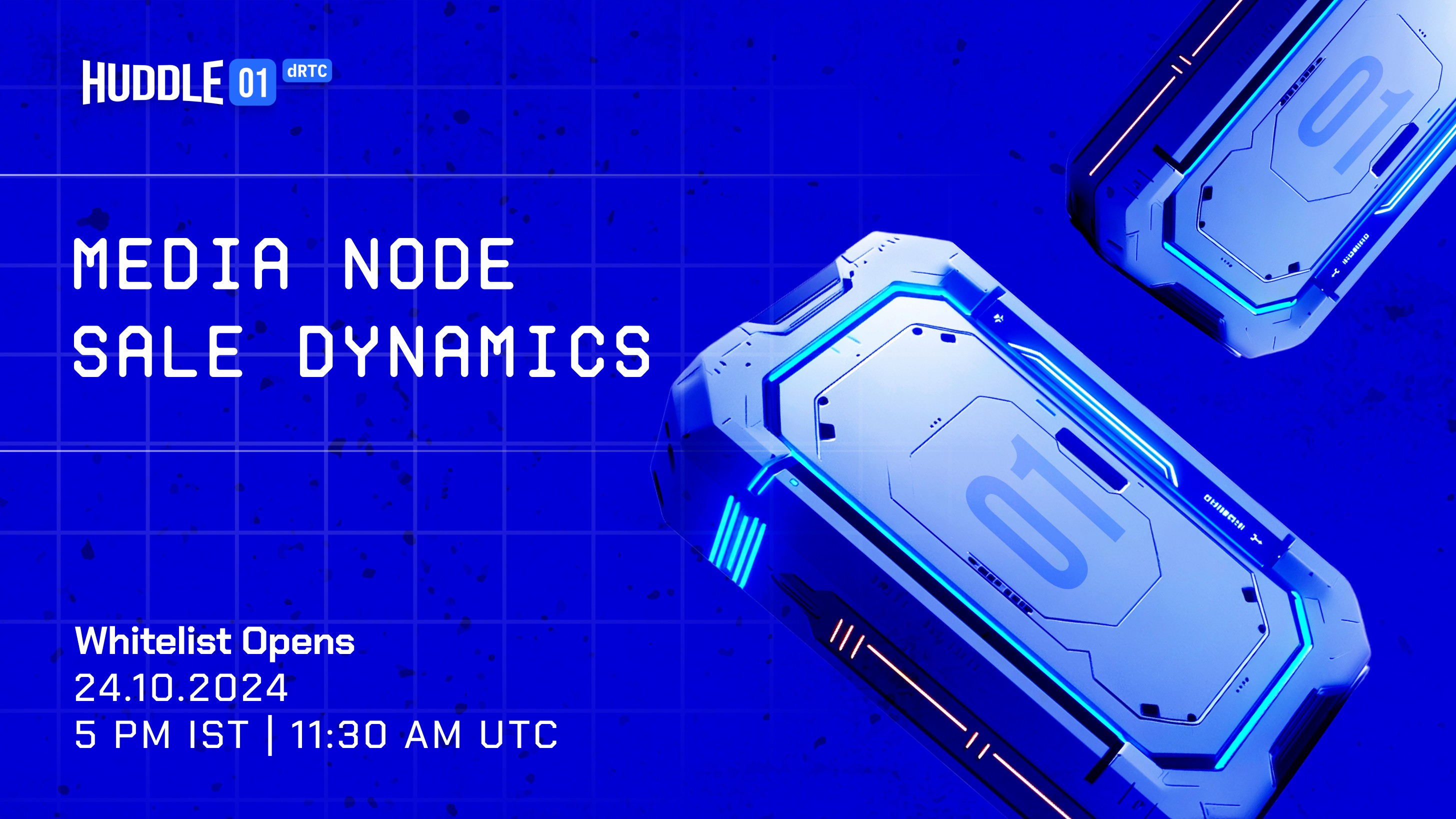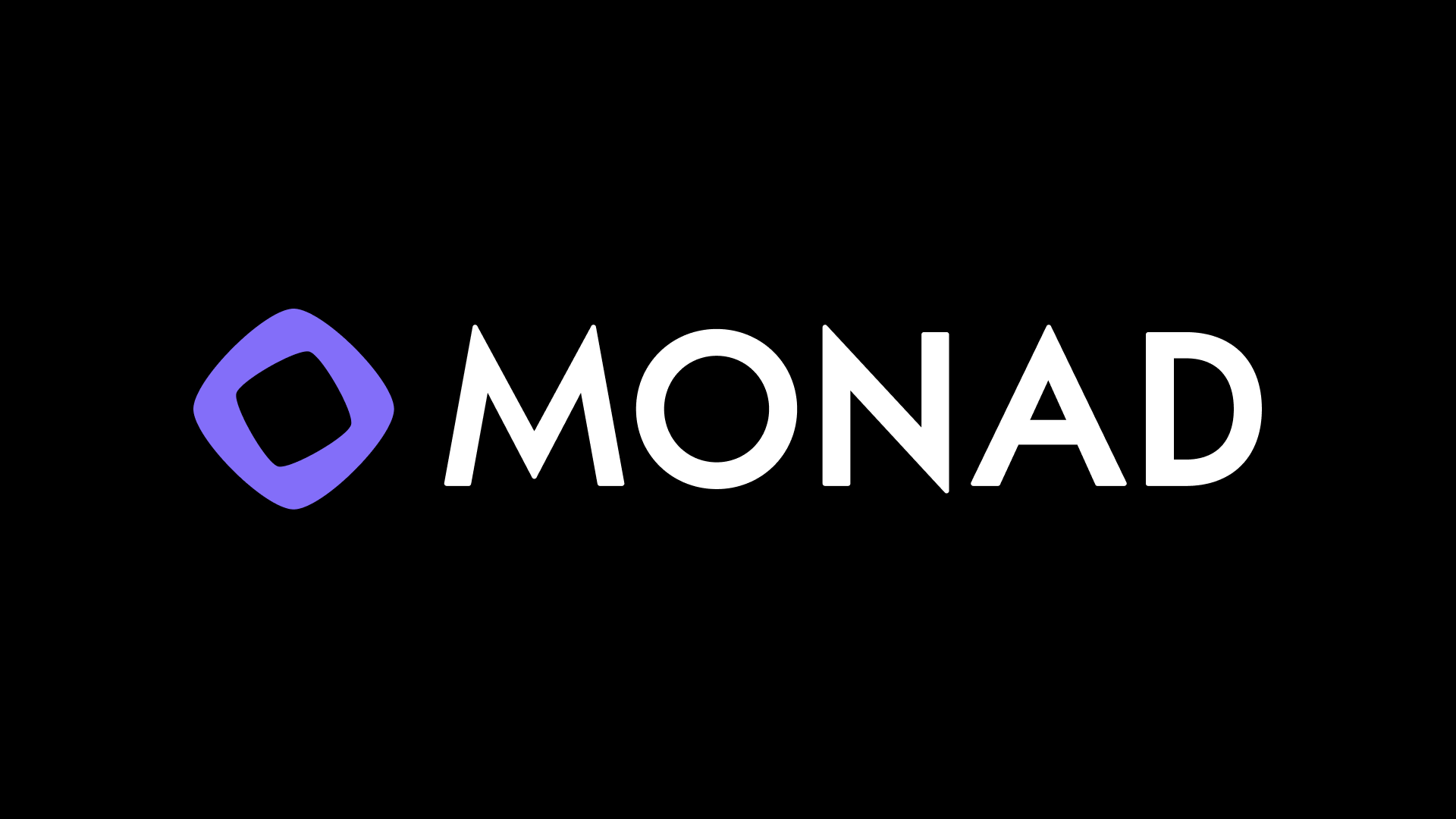Huddle01, the Challenger to the Giants Zoom and Google Meet
Posted on November 8, 2024 by Admin

What is Huddle01, and why does it have 01 in its name?
Huddle01 is building a decentralized real-time communication (dRTC) platform as an innovative alternative to traditional video conferencing services such as Zoom and Google Meet. Utilizing blockchain technology, Huddle01 seeks to enhance performance, lower latency, and minimize infrastructure expenses, ultimately creating a more efficient and scalable communication solution.

"01" in Huddle01 symbolizes binary code—the fundamental basis of all digital communication. Specifically:
- It reflects the technology that makes virtual meetings possible.
- The number "01" represents the bits 0 and 1 in the binary system, which form the foundation of all data and digital communication.
- The use of "01" in the name emphasizes the technological and digital nature of the Huddle01 platform.
- It also suggests the simplicity and efficiency of digital communication, where only the two digits 0 and 1 are needed to create the entire digital world.
Problems Huddle01 Aims to Solve
- High costs of centralized communication systems: Huddle01 reduces server costs for developers by up to 95% compared to services like AWS by utilizing unused internet bandwidth through node operators.
- High latency due to geographical location: With its decentralized network, Huddle01 lowers latency to approximately 13 milliseconds in New York, compared to 141 milliseconds on Google Meet and 20 milliseconds on Zoom.
- Security and privacy concerns: Huddle01 enhances security and user privacy through end-to-end encryption and secure video storage on the InterPlanetary File System (IPFS).
- Lack of integration with Web3 technology: The platform supports wallet connections, uses NFTs as avatars, and enables token-gated meetings, deeply integrating with Web3 technology.
- Limited scalability of centralized systems: Huddle01's decentralized model allows for easier scalability, supporting up to 10,000 participants in a single room.
- High costs for small and medium-sized enterprises (SMEs): Huddle01 offers a cost-effective communication solution for SMEs, freelancers, and digital nomads.
- Dependence on centralized infrastructure: Huddle01 builds the first Decentralized Physical Infrastructure Network (DePIN) for RTC, reducing reliance on centralized servers.
- Difficulties integrating crypto payments: The platform supports crypto payment integration, reducing transaction fees and expanding global market accessibility.
Current Products of the Project
- Huddle01 Meet: This is the main video and audio conferencing application of Huddle01. It allows users to host high-quality, low-latency online meetings. Integrates Web3 features such as wallet connection, using NFTs as avatars, and hosting token-gated meetings.
- Huddle01 SDK: A software development kit that enables developers to integrate Huddle01’s real-time communication functionality into their own applications. Supports both web and mobile platforms.
- Media Nodes Network: A decentralized infrastructure providing bandwidth for audio and video calls. Users can purchase and operate these nodes to contribute to the network and earn $HUDL tokens.
- Huddle01 CLI: A command-line tool that makes it easier for developers to set up and manage projects using Huddle01.
- iFrame Integration: Allows quick integration of Huddle01’s functionalities into existing websites via iFrame.
- Secure Video Storage Platform: Utilizes the InterPlanetary File System (IPFS) for secure and decentralized storage of recorded videos.
Huddle01 has supported over 6 million meeting minutes for more than 100,000 events and has been integrated by over 100 Web3 projects, including Lens Protocol, Solana, and CyberConnect. The project continues to develop and expand its products and features to meet the growing demand for decentralized real-time communication solutions.

We have used Huddle01 Meet for an extended period, with meetings lasting up to 5 hours (without needing to create a new meeting like on Google Meet). The audio quality during calls between participants is high, noticeably different from other products. The video screen sharing is also of high resolution. An amazing experience, we will use it for our future meetings.
Huddle01 is set to launch an upcoming node sale featuring 46,900 media nodes available in two phases, each priced at $320 per node. Phase 1 will kick off on November 6, 2024, exclusively for whitelisted participants, followed by a public sale starting on November 8. To operate a node, participants must have an internet connection with a minimum speed of 250 Mbps. The project plans to launch its testnet two weeks following the completion of the Phase 1 sale.

Funds and individual investors

Conclusion
Overall, this seems to be a very promising project with a bright future ahead. We are impressed by the project's product. We have great confidence in the project and are currently ranked number 1 in node sale referrals. If you are interested in purchasing a node, please use our referral, which is our wallet address:
https://node.huddle01.com/invite?promo=0xA41B1adB2dF768aE599B34fcA2D1562418bF64db

Top post

Blockcast: Accelerating the Internet, Connecting the World
What is Blockcast? Blockcast is a next-generation Content Delivery Network (CDN) that uses multicast technology to address bandwidth challenges in the era of booming streaming. Born at UC Berkeley, the project aims to build a decentralized network that leverages community power to deliver high-quality content like 4K and 8K globally while slashing costs for providers. With the slogan "Content Delivery, Powered By You!", Blockcast is not just a technology but an ecosystem where anyone can parti
June 2, 2025

Analysis of Nockchain: A ZK-Proof-of-Work Blockchain
Introduction to Nockchain In the fast-evolving world of blockchain, Nockchain emerges as a unique project aiming to revolutionize decentralized computing. Founded in 2023 in Berlin, Germany, Nockchain is a high-throughput blockchain leveraging a Zero-Knowledge Virtual Machine (ZKVM) and a novel ZK-Proof-of-Work (ZKPoW) consensus mechanism. With its native token, $NOCK, and a promise of a fair launch, Nockchain has sparked interest in the Web3 community. However, controversies at its mainnet lau
May 29, 2025

Monad: The Future of Layer 1 Blockchain with Unparalleled Performance
As the blockchain industry continues to evolve, Monad emerges as a promising Layer 1 (L1) blockchain, delivering exceptional performance and scalability. Aiming for 10,000 transactions per second (TPS), a block time of just 0.5 seconds, and full compatibility with the Ethereum Virtual Machine (EVM), Monad is capturing the attention of developers and users alike. Let’s dive into the details of this groundbreaking project and discover how you can get involved today! What is Monad? Monad is a La
May 12, 2025

Drosera Network: Revolutionizing DeFi Security and How to Run a Node
Decentralized Finance (DeFi) has transformed the financial landscape, but with great innovation comes great risk. Since 2014, DeFi protocols have lost nearly $80 billion to exploits, highlighting the urgent need for robust security solutions. Enter Drosera Network, a decentralized security protocol built on Ethereum that aims to safeguard DeFi ecosystems through automated threat detection and response. In this article, we’ll dive deep into what Drosera Network is, why it matters, and provide a s
April 20, 2025

Gensyn: Revolutionizing AI Compute and Guide to Running a Node
Introduction to the Gensyn Project Gensyn is a decentralized Machine Learning Compute Protocol designed to connect global computing resources into a supercluster tailored for artificial intelligence (AI). Developed by a UK-based team, Gensyn aims to reduce the costs of training AI models, increase accessibility for researchers, engineers, and academics, and ensure transparency and censorship resistance through blockchain technology. Goals and Vision * Cost Reduction: Gensyn claims it can cu
April 14, 2025

Pipe Network: The Future of Decentralized CDN and Opportunities from the Node DevNet 2 Program
In the digital era, where the speed of content delivery is a critical factor, content delivery networks (CDNs) have become indispensable in ensuring a seamless user experience. However, giants like Cloudflare and Akamai, while powerful, remain constrained by their traditional centralized models. Enter Pipe Network—a decentralized CDN built on the Solana blockchain—emerging as a fresh contender promising to revolutionize how we approach content distribution. Notably, its current Node DevNet 2 pro
March 18, 2025